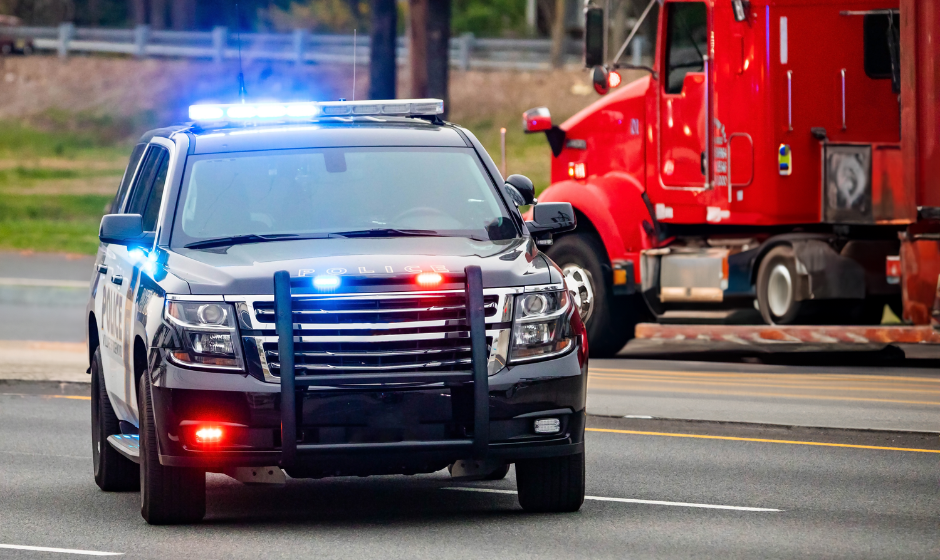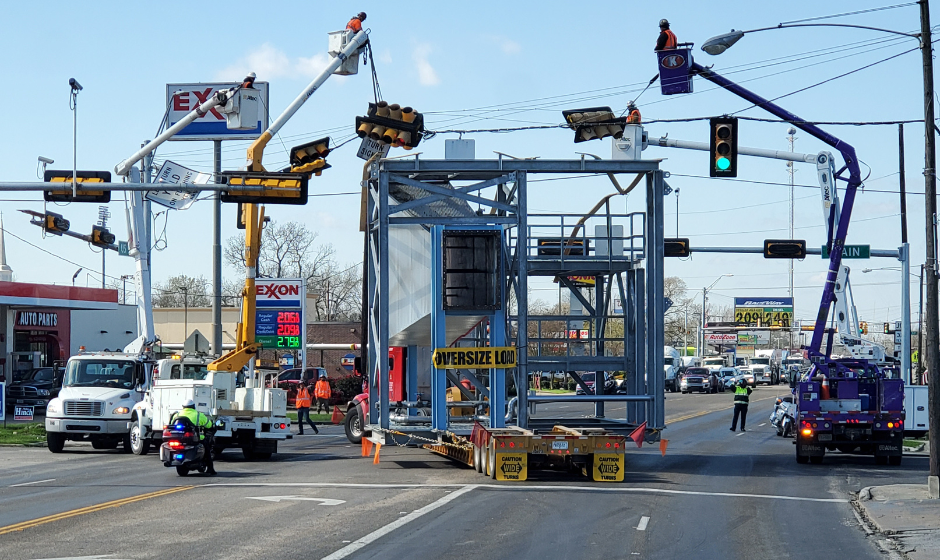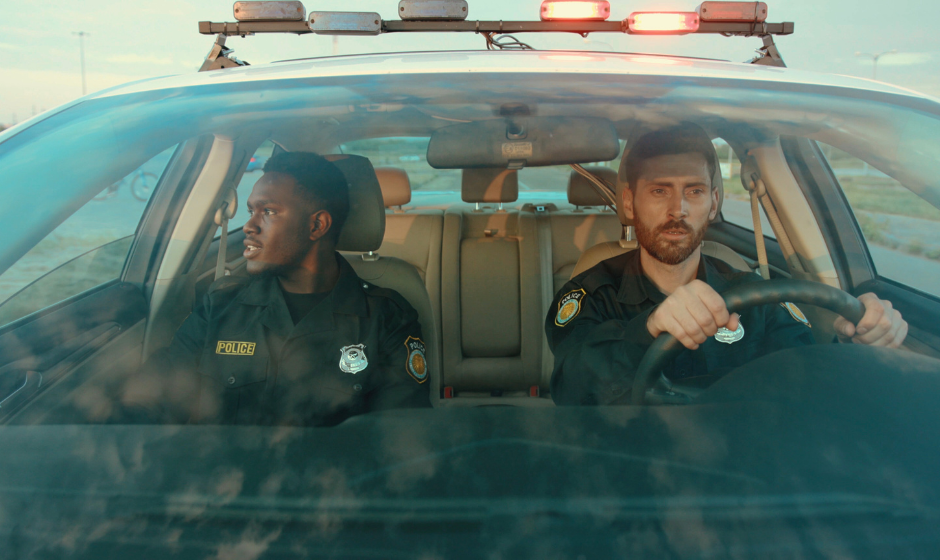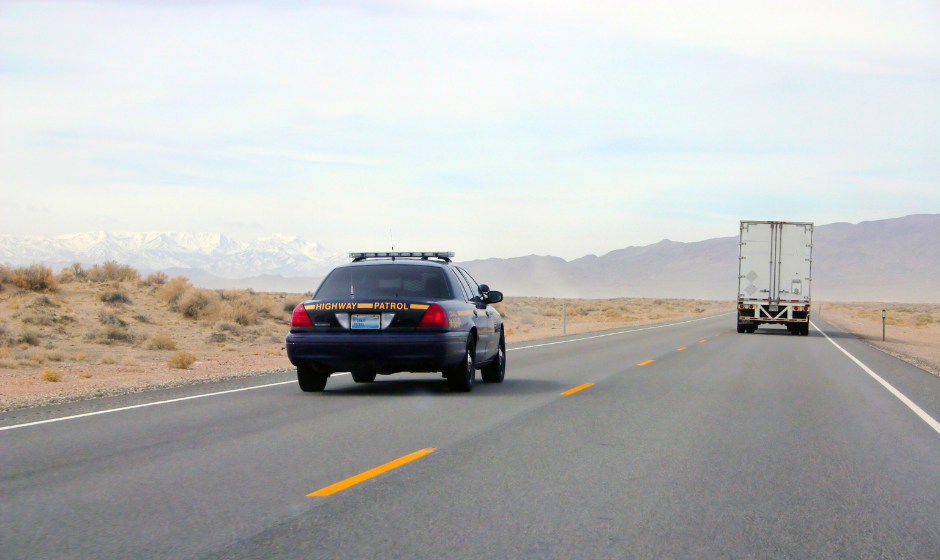
You watch a shiny new patrol car blaze past you, lights flashing. You catch a glimpse of the officer behind the wheel. The focused determination on their face never wavers as they escort a VIP down the highway. Is it the President? A foreign dignitary? Beyoncé?
Nope — all that pomp and circumstance is actually in the name of safe, legal shipping.
The VIP in question? An over-dimensional (OD) freight load.
Police escort requirements for shippers are so variable, it’s hard to give a blanket “Yes, that shipment will need a police escort,” or “No, that shipment won’t need a police escort.”
That means smart shippers must be aware that over-dimensional loads may need a police escort at one or more points in their journey.
You should also be aware that if your shipment does call for a police escort, it will require additional planning before any freight moves.
At Anderson Trucking Service (ATS), we’ve helped hundreds of shippers like you coordinate their police escorts. As experts in the industry, we highly recommend working with a reputable transportation provider to plan and execute your shipment.
Professional guidance can make the difference between a seamless shipment and a total logistical nightmare. To that end, we’ve put together this guide to tell you everything you need to know about police escort requirements in freight shipping.
This comprehensive article will break down the purpose, cost, and logistics of police escorts for freight shipments, including patrol escort requirements by state.
So, if you’re shipping wide, tall, long, or heavy this year, keep reading!
- What is the purpose of a police escort in trucking?
- When are police escorts needed for freight transport?
- Police escort requirements by state
- What does a police escort cost?
- How to arrange a police escort for your shipment
What Is The Purpose of a Police Escort in Trucking?
The purpose of a police escort is to protect the motoring public while an OD load moves. By accompanying the load as it travels, police can increase drivers’ awareness of the truck and encourage caution.
Escort cars, also called pilot vehicles, are another form of trucking escort, but police can be used to provide an even higher level of visibility. (We all pay way more attention to our driving when we see those flashing blue and red lights, right?)
A police escort can also serve as traffic control when a load moves through a particularly busy or intricate intersection, or if a load must cross the center line.
A police escort may also conduct a pre- or post-trip vehicle inspection to ensure the truck and trailer are both in safe operating condition for the journey ahead.

When Are Police Escorts Needed For Freight Transport?
Most states require a police escort when a dimension exceeds a certain measurement.
Excessive width is the most common trigger for a police escort requirement, but excessive length, height and weight can all require an escort, too.
Some states will require non-police escort vehicles at a certain dimensional threshold, then add a police escort at another threshold beyond that. A small handful of states never require police escorts at all.
A very general rule of thumb is to expect to need a non-police escort for shipments that exceed:
- 12 feet wide
- 14 feet 6 inches high (loaded)
- 90 feet (total length)
Related: When Are Escorts/Pilot Cars Necessary For Oversized Freight Shipments?
Once your width and/or height measurement meets or exceeds 16 feet, you’re likely looking at a police escort in most states — though, again, this varies.
Your transportation provider will be able to plan the route-of-least-resistance (and cost) and help you understand escort requirements, costs, and logistics.
Police Escort Requirements By State
In the broadest terms, police escorts are required to move some OD loads in some states. Not all OD loads require police escorts. If your load does require a police escort in one state, it may not need a police escort in another.
It all depends on where you are traveling and the dimensions of your load. Each state has its own requirements for police escorted freight shipments; every time a shipment passes into a new state, it will need the correct permitting and any requisite escorts to travel legally.
To help you understand at a glance if your shipment may need a police escort, we’ve put together a chart breaking down police escort requirements by state.
It’s important to note that the requirements listed in this chart aren’t gospel. States can — and do — change or selectively enforce their requirements at their own discretion.
Ultimately, the language on your permit is the final word. Lean on the expertise of your transportation provider and your permits to determine your shipment’s actual needs.
NOTE: The chart below does not include non-police pilot car/escort requirements. It reflects state government requirements for police escorts only.
|
STATE |
POLICE ESCORT REQUIREMENTS |
|
Alabama |
Over 16’ wide, 16’ high, or 150’ long. |
|
Alaska |
Typically not required. |
|
Arizona |
Over 20’ wide. May be required over 120’ long, 14’ wide or 15’ high, at state’s discretion. See permit once approved. |
|
Arkansas |
Only required if traveling on the Parkway and at/over 15’ wide. |
|
California |
At/over 135’1” long, 15’1” wide, or 17’1” high. If traveling on green routes, required at 15’ wide. May be required over 250,000 lbs., at state’s discretion. See permit once approved. |
|
Colorado |
Over 20’ wide or 500,000 lbs. |
|
Connecticut |
Over 150’ long, 16’ wide, or 15’4” high. Also required if over both 13’5” wide and 15’3” high. |
|
Delaware |
Over 15’ wide, 17’5” high, or 120,000 lbs. |
|
Florida |
Over 16’ wide, 16’ high, or 250’ long. |
|
Georgia |
Over 16’3” wide. May be required over 16’ wide, at state’s discretion. See permit once approved. |
|
Hawaii |
Typically not required. |
|
Idaho |
May be required over 20’ wide and 20’ high; see permit once approved. |
|
Illinois |
Over 18’ wide, 18’ high, or 200’ long. |
|
Indiana |
Over 17’ wide, 175’ long, or 199,999 lbs. |
|
Iowa |
Over 18’ wide or 300,000 lbs. |
|
Kansas |
Typically not required. |
|
Kentucky |
Typically not required. |
|
Louisiana |
Over 16’ wide, 16’ high, or 125’ long. |
|
Maine |
Over 16’ wide or 124’11” long. |
|
Maryland |
At/over 16’ wide, 16’ high, 150’ long, or 150,000 lbs. |
|
Massachusetts |
Over 16’ wide, 15’ high, 134’ long, or 130,000 lbs. |
|
Michigan |
Over 16’ wide. |
|
Minnesota |
Any load that crosses the center line. |
|
Mississippi |
Over 16’ wide or 16’ high. May be required at 15’8” high depending on route. See permit once approved. |
|
Missouri |
Over 18’ wide, 17’ high, or 150’ long. Also required over 16’ wide on two-lane roads. |
|
Montana |
Typically not required. |
|
Nebraska |
Typically not required. |
|
Nevada |
Over 19’ wide. Also required over 17’ wide on two-lane roads. |
|
New Hampshire |
Over 18’ wide or 100’ long. |
|
New Jersey |
Typically not required. |
|
New Mexico |
May be required over 20’ wide; case-by-case at state’s discretion. |
|
North Carolina |
Over 16’1” wide or 16’5” high. |
|
North Dakota |
Over 18’ wide. |
|
Ohio |
Over 16’ wide, 15’3” high, or 199,000 lbs. Also may be required if any two combined dimensions exceed 90’ long, 13’ wide, or 140,000 lbs. |
|
Oklahoma |
Over 22’11” wide. |
|
Oregon |
Typically not required. |
|
Pennsylvania |
Over 16’ wide, 160’ long, or 199,999 lbs. |
|
Rhode Island |
Typically not required. |
|
South Carolina |
Over 16’ wide. |
|
South Dakota |
Over 18’ high. |
|
Tennessee |
Over 18’ wide or 18’ high. May also be required in the case of especially complex movements, at state’s discretion. |
|
Texas |
Over 20’ wide. |
|
Utah |
Over 17’ wide, 17’6” high, or 174’11” long. May be required over 16’ wide on southern routes. |
|
Vermont |
Over 14’11” wide, 13’11” high, 99’11” long, or 149,999 lbs. |
|
Virginia |
Typically not required. |
|
Washington |
Over 18’ wide or 18’ high. |
|
West Virginia |
May be required over 16’ wide, at state’s discretion. |
|
Wisconsin |
Over 200’ long, 18’ wide, or 350,000 lbs. |
|
Wyoming |
Typically not required. |
Related: Legal Freight Limits: Trucking Industry Weight, Width, Height and Length Limits
What Does a Police Escort Cost?
Each shipment is unique, and each law enforcement agency prices differently, making it impossible to estimate what your costs will be for your specific shipment.
But in general, you can expect a police escort to significantly increase your overall shipping costs.
That’s because for most shipments requiring a police escort, pricing is determined by the number of officers and the cost of the specific officer(s)’ time and wages. The officer(s)’ experience and rank may also factor into your final costs.
Some agencies pay time and a half for freight escorts, a cost the shipper will incur. Other states have implemented a flat rate for patrol escorts. Regardless, you can safely assume that if your shipment requires one or more officers to assist as escort, your shipping costs will increase.

How To Arrange a Police Escort For Your Shipment
As a shipper, you’ll rely on your transportation provider to arrange police escorts. They’ll connect with the proper law enforcement agencies on the need for an escort, schedule the time and date, and determine cost.
In some cases, a police escort can be arranged in a single phone call — nice and simple. In others, there may be agreements to sign or permits that must be in-process or already received before any arrangements can commence.
This may sound like a hands-off process from the shipper’s point of view, but there are several steps you can take to help it all go smoothly.
Police escort requirements and freight permitting requirements are closely linked and overlap in many places. That means it’s absolutely vital to double-check your shipment information before filing for any permits.
Giving your provider accurate information empowers them to work as efficiently as possible on your behalf. It will also prevent any surprise permitting or unexpected costs.
On the whole, practicing clear, consistent communication is the best way to safeguard against problems.
Related: When Freight Shipping Goes Wrong: How to Avoid and Address Problems
Give your provider as much information about your shipment as you can, as early as you can, and provide regular updates about any changes to critical load information.
Finally, approaching your shipment with a healthy dose of patience can go a long way.

No shipment requiring a patrol escort is going to move next-day. Your provider needs time to arrange the necessary resources, so don’t expect a lightning-quick turnaround.
Instead, approach the process with the understanding that things will take longer than they would otherwise. This is true even if you regularly ship multi-axle freight on the lane in question. If your shipment needs a police escort, it may take several days longer to move due to scheduling conflicts.
That's because no matter how proactive you and your transportation provider have been, you’re still at the mercy of law enforcement.
Scheduling issues, travel time restrictions, weather delays, staffing shortages — any number of things could delay your police-escorted shipment. The solution? Plan ahead, pack your patient pants, and try not to stress. Trust that your provider is doing everything they can to get your shipment moving ASAP.
Ready to Get Your OD Permits?
The purpose of a police escort in freight shipping is to keep the general motoring public — and your cargo — safe and moving efficiently.
Each state has its own requirements for oversized freight. This can make determining when and where your shipment will need a police escort (if at all) a complicated endeavor.
With that in mind, it’s important to work closely with your transportation provider on permitting. This will ensure you have the correct permits and escorts to legally move freight in each state you pass through.
Working with an experienced transportation provider can alleviate this logistical headache. Transportation experts who regularly ship OD freight are your best resource for streamlining your permitting and escort arrangements.
Speaking of permitting: Now that you understand how closely-linked OD permitting and police escort requirements are, check out our video on How To Get Over-Dimensional (OD) Permits.
Resident OD permit expert Joanna will talk you through three easy steps you can take to get the right permits for your freight, fast.
Have pressing questions about your freight? You can always contact ATS! We’re happy to share our knowledge to help you make the best decisions for your business.
